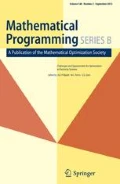Abstract
We consider the problem of computing a large stable matching in a bipartite graph \(G = (A\cup B, E)\) where each vertex \(u \in A\cup B\) ranks its neighbors in an order of preference, perhaps involving ties. Let the matched partner of u in a matching M be M(u). A matching M is said to be stable if there is no edge (a, b) such that a is unmatched or prefers b to M(a) and similarly, b is unmatched or prefers a to M(b). While a stable matching in G can be easily computed in linear time by the Gale–Shapley algorithm, it is known that computing a maximum size stable matching is APX-hard. In this paper we first consider the case when the preference lists of vertices in A are strict while the preference lists of vertices in B may include ties. This case is also APX-hard and the current best approximation ratio known here is 25/17 \(\approx 1.4706\) which relies on solving an LP. We improve this ratio to 22/15 \(\approx 1.4667\) by a simple linear time algorithm. Here we first compute a half-integral stable matching in \(\{0,0.5,1\}^{|E|}\) and then round it to an integral stable matching M. The ratio \(|\mathsf {OPT}|/{|M|}\) is bounded via a payment scheme that charges other components in \(\mathsf {OPT}\oplus M\) to cover the costs of length-5 augmenting paths. There will be no length-3 augmenting paths here. We next consider the following special case of two-sided ties, where every tie length is 2. This case is known to be UGC-hard to approximate to within 4/3. We show a 10/7 \(\approx 1.4286\) approximation algorithm here that runs in linear time.







Similar content being viewed by others
Notes
x is a fractional matching if the following conditions hold: (1) for each vertex \(v \in A \cup B\), \(\sum _{e \in \delta (v)} x_e \le 1\), where \(\delta (v)\) is the set of edges incident on v, and (2) for each edge \(e \in E\), \(0 \le x_e \le 1\).
We note that the idea of the bounce step is similar to the concept of “flighty woman” of Király [13].
References
Askalidis, G., Immorlica, N., Kwanashie, A., Manlove, D., Pountourakis E.: Socially stable matchings in the hospitals/residents problem. In: Algorithms and Data Structures. Lecture Notes in Computer Science, vol. 8037, pp. 85–96. Springer, Berlin, Heidelberg (2013)
Gale, D., Shapley, L.S.: College admissions and the stability of marriage. Am. Math. Mon. 69, 9–15 (1962)
Gale, D., Sotomayer, M.: Some remarks on the stable marriage problem. Discrete Appl. Math. 11, 223–232 (1985)
Gusfield, D., Irving, R.W.: The Stable Marriage Problem: Structure and Algorithms. MIT Press, Boston, MA (1989)
Halldórsson, M.M., Iwama, K., Miyazaki, S., Yanagisawa, H.: Improved approximation results for the stable marriage problem. ACM Trans. Algorithms 3(3), 30 (2007)
Halldórsson, M.M., Iwama, K., Miyazaki, S., Yanagisawa, H.: Randomized approximation of the stable marriage problem. Theor. Comput. Sci. 325(3), 439–465 (2004)
Irving, R.W.: Stable marriage and indifference. Discrete Appl. Math. 48, 261–272 (1994)
Irving, R.W., Manlove, D.F.: Approximation algorithms for hard variants of the stable marriage and hospitals/residents problems. J. Comb. Optim. 16(3), 279–292 (2008)
Iwama, K., Manlove, D.F., Miyazaki, S., Morita, Y.: Stable marriage with incomplete lists and ties. In: 36th ICALP, pp. 443–452 (1999)
Iwama, K., Miyazaki, S., Yamauchi, N.: A 1.875—approximation algorithm for the stable marriage problem. In: 18th SODA, pp. 288–297 (2007)
Iwama, K., Miyazaki, S., Yanagisawa, H.: A 25/17—approximation algorithm for the stable marriage problem with one-sided ties. Algorithmica 68(3), 758–775 (2014)
Király, Z.: Better and simpler approximation algorithms for the stable marriage problem. Algorithmica 60(1), 3–20 (2011)
Király, Z.: Linear time local approximation algorithm for maximum stable marriage. Algorithms 6(3), 471–484 (2013)
Knuth, D.: Mariages stables et leurs relations avec d’autre problèmes. Les Presses de l’université de Montréal (1976)
Manlove, D.: Algorithmics of Matching Under Preferences. World Scientific Publishing Company, Singapore (2013)
Manlove, D.F., Irving, R.W., Iwama, K., Miyazaki, S., Morita, Y.: Hard variants of stable marriage. Theor. Comput. Sci. 276(1–2), 179–261 (2002)
McDermid, E. J.: A 3/2 approximation algorithm for general stable marriage. In: 36th ICALP, pp. 689–700 (2009)
Paluch, K.: Faster and simpler approximation of stable matchings. In: 9th WAOA, pp. 176–187 (2011)
Radnai, A.: Approximation algorithms for the stable matching problem. Master Thesis, Department of computer science, Eötvös Loránd University (2014)
Roth, A., Sotomayor, M.: Two-Sided Matching: A Study in Game-Theoretic Modeling and Analysis. Cambridge University Press, Cambridge (1992)
Teo, C.-P., Sethuraman, J., Tan, W.P.: Gale-Shapley stable marriage problem revisited: strategic issues and applications. In: 7th IPCO, pp. 429–438 (1999)
Vate, J.V.: Linear programming brings marital bliss. Oper. Res. Lett. 8, 147–153 (1989)
Yanagisawa, H.: Approximation algorithms for stable marriage problems. Ph.D. Thesis, Kyoto University (2007)
Author information
Authors and Affiliations
Corresponding author
Additional information
A preliminary version of this work appears in the 17th Conference on Integer Programming and Combinatorial Optimization (IPCO 2014). Part of this work was done when the second author visited the Max-Planck-Institut für Informatik, Saarbrücken under the IMPECS program.
Rights and permissions
About this article
Cite this article
Huang, CC., Kavitha, T. Improved approximation algorithms for two variants of the stable marriage problem with ties. Math. Program. 154, 353–380 (2015). https://doi.org/10.1007/s10107-015-0923-0
Received:
Accepted:
Published:
Issue Date:
DOI: https://doi.org/10.1007/s10107-015-0923-0




